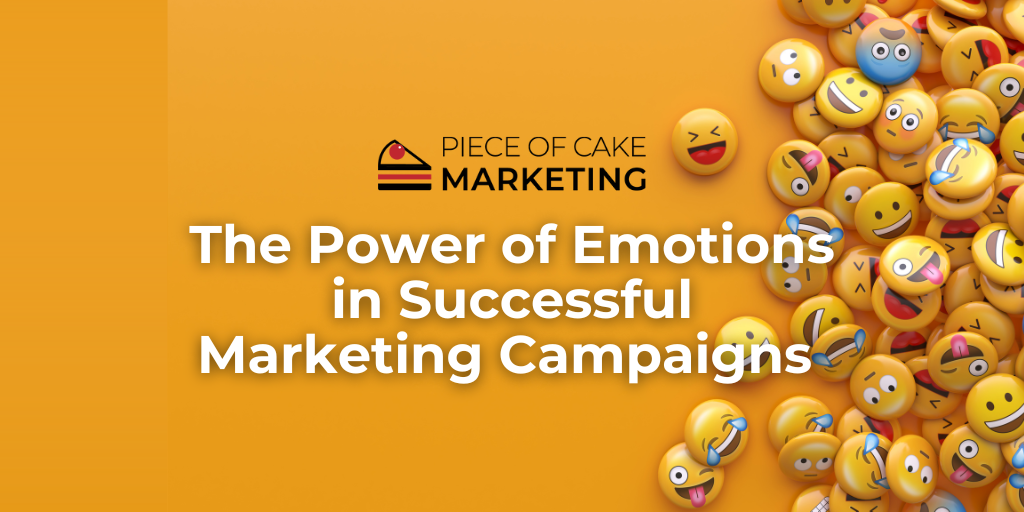While logic and reason play essential roles in our decision-making process, it’s the emotional connection that often sets the most successful marketing campaigns apart from the rest. In this blog, we’ll explore the profound impact emotions have on marketing and why they are the secret ingredient to winning over your audience.

The Emotional Connection in Marketing
Emotions are a universal and integral part of how we all connect. They shape our everyday decisions, colour our memories, and influence our actions. Successful marketing campaigns grasp this fundamental truth and wield the power of emotions to forge a profound connection with their audience.
Consider some of the most unforgettable and effective marketing campaigns you’ve come across. More often than not, they leave a lasting impact by eliciting a powerful feeling within you—be it laughter, joy, inspiration, or even a tear in your eye. Brands that understand the art of evoking emotions in their audience have a remarkable ability to create indelible impressions and nurture strong, loyal customer relationships.
The key to this emotional connection lies in crafting narratives that resonate with your audience’s aspirations, values, and experiences. Whether it’s sharing heartwarming stories that tug at the heartstrings, leveraging humour to evoke laughter, or highlighting societal issues that spark reflection and action, the emotional touchstone is what sets great marketing campaigns apart.
This emotional resonance not only drives customers to engage with the brand but also cultivates a deep sense of loyalty, transforming them into brand advocates who willingly spread the word to others. In essence, the art of emotional marketing is about recognising that you’re not just selling a product or service; you’re selling an experience, a feeling, and a connection. It’s the emotional link that transforms a transactional interaction into a lasting and profound relationship between the brand and its customers.
Storytelling Marketing that Resonates with Your Audience
Storytelling is a potent tool in the marketer’s arsenal, and it’s the infusion of emotion that breathes life into compelling narratives. When a brand tells a story that resonates with the emotions of its audience, it transcends the realm of just another advertisement or message. It becomes a part of the customer’s own story, a connection that can endure a lifetime.
Take the iconic release of Christmas ads, for instance. Year after year, these ads have a remarkable ability to evoke a sense of warmth, togetherness, and nostalgia. They tap into our emotions, reminding us of the sheer joy of the festive season and the significance of sharing those precious moments with loved ones. As a result, many Christmas ads have seamlessly integrated themselves into the annual tradition of many families, associating the brand with these positive emotions and creating an enduring bond.
The magic of storytelling in marketing lies in the capacity to create a shared experience. It’s not merely about selling a product or service; it’s about inviting the audience to be a part of a larger narrative. A well-crafted story can touch on universal themes, such as love, aspiration, or overcoming challenges, that resonate with a wide array of people. By striking these emotional chords, brands can foster a sense of belonging and identification among their customers. These narratives have the power to spark conversations, drive engagement, and create brand loyalty. In essence, effective storytelling marketing doesn’t just communicate a message; it embeds the brand within the fabric of the customer’s own story, resulting in a relationship that can withstand the test of time.
Marketing that Creates Trust and Loyalty

Emotionally driven marketing is a powerful instrument in this endeavour because it’s not just about selling a product or service; it’s about establishing that vital connection and trust with your audience. When brands successfully tap into the emotions of their customers, they create a bond that goes beyond transactional interactions, and this connection becomes the bedrock of brand loyalty.
Consider the tech giant Apple as a quintessential example of a brand that has perfected the art of building trust through emotional marketing. Apple’s marketing campaigns often pivot on themes such as innovation, creativity, and empowerment. Their advertisements frequently evoke emotions tied to aspiration and the pursuit of excellence. By creating a profound emotional resonance with their audience, Apple has managed to cultivate a fiercely loyal customer base. These are customers who aren’t just buying a product; they’re investing in a brand that reflects their values and desires. The emotional connection they’ve established with their audience is the driving force behind the cult-like following of Apple products, with customers returning year after year to purchase the latest innovations.
In the modern marketplace, trust is a precious commodity. People are more inclined to buy from brands they feel a genuine connection with, as trust begets customer loyalty. Emotional marketing strategies, such as those mastered by Apple, work by understanding the aspirations and values of their audience and weaving those into their brand narratives. These strategies tap into the deepest emotional currents, creating a bond that surpasses mere product offerings and fosters unwavering brand loyalty. Brands that master this art of emotional marketing are the ones that not only create customers but also champions of their brand, individuals who become advocates and ambassadors, willingly spreading the word about a brand they trust and believe in.
Emotion in Marketing Drive Action
In the realm of marketing, it’s important to understand that while logic and reason may inform our decisions, it’s our emotions that serve as the primary driving force behind taking action. The emotional response elicited by a marketing campaign is what compels people to click, purchase, share, or engage in any other desired action. The more intense the emotional connection between a brand and its audience, the more likely that audience is to take decisive action.
A compelling real-world example of how emotions can effectively drive action is the “Ice Bucket Challenge” campaign, which rapidly went viral to raise awareness and funds for ALS (Amyotrophic Lateral Sclerosis) research. What made this campaign so potent was its ability to tap into the emotions of participants and onlookers alike. People were motivated to take part in this challenge because of the powerful emotions associated with empathy and the desire to make a positive impact. It provided individuals with a platform to not only express their support for a cause but also to experience the joy of altruism, creating a profound emotional bond between the campaign and its participants. This emotional connection led to widespread sharing, participation, and ultimately, a remarkable impact in terms of raising both awareness and funds for ALS research.
In marketing, the ability to evoke emotions that drive action is a powerful skill. By understanding the emotional needs, desires, and values of the target audience, brands can craft campaigns that resonate deeply and compel individuals to take meaningful actions, whether it’s making a purchase, supporting a cause, or becoming an advocate for the brand. Emotions are the catalysts that transform passive viewers into active participants, making them an essential element in the art of effective marketing.
Standing Out in a Crowded Market
The strategic use of emotions in marketing emerges as the secret weapon, enabling brands to differentiate themselves from the sea of competitors. The emotional connection established through marketing campaigns is what etches your brand into the collective memory of your audience, creating a distinct and lasting imprint.
Amidst the multitude of options and choices available to consumers, it’s often the emotional resonance with a brand that leads to lasting impressions. A brand that can invoke powerful emotions in its audience has a better chance of being remembered and recognised.
In a crowded market, where products and services may seem largely similar, it’s the emotional connection that becomes the distinguishing factor. When customers associate a brand with specific emotions, values, or experiences, that brand gains a competitive edge by resonating with the individual on a deeper, personal level. Whether it’s evoking joy, trust, aspiration, or nostalgia, the emotional connection in marketing is the conduit through which brands can transcend the noise and make their mark.
Emotions in Marketing Create Connections
In marketing, logic and reason have their place, but it’s the power of emotions that sets the most successful campaigns apart from the rest. Emotions create connections, build trust, drive action, and help your brand stand out in a crowded market. When you understand the emotional needs and desires of your audience, you can craft marketing campaigns that resonate on a deeply personal level. So, the next time you’re planning a marketing strategy, remember that to truly captivate your audience, you’ll need more than just facts and figures; you’ll need the magic of emotions.
Working with Piece of Cake Marketing to Add Emotion to Your Content
If you need some inspiration or support with your content creation and planning for your social media accounts, Piece of Cake marketing can help. Ask us about our social media content creation service. We will look to prepare your social media content calendar for the month, based on your marketing objectives. To find out more, check out our website here: Social Media Content Creation Service.
